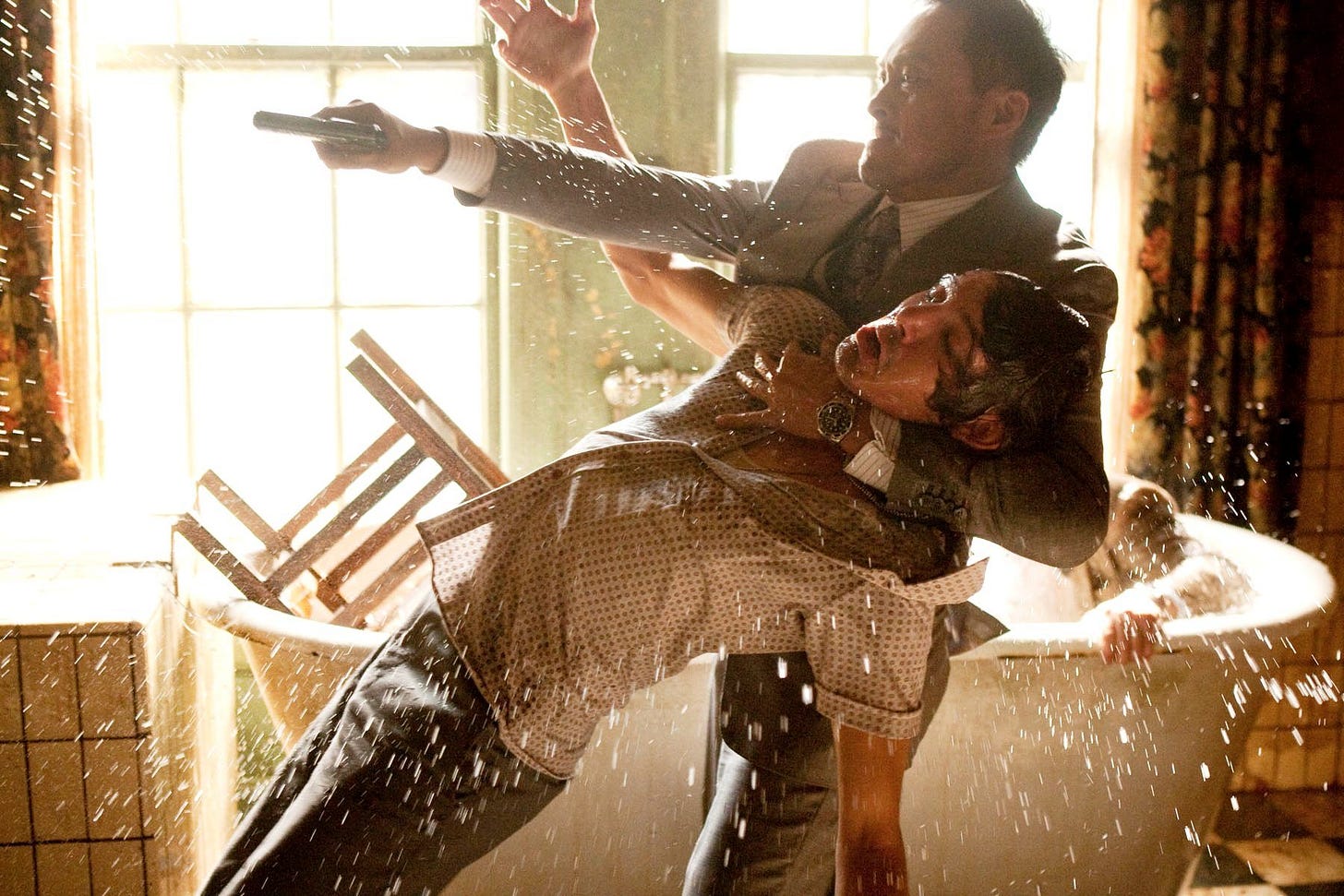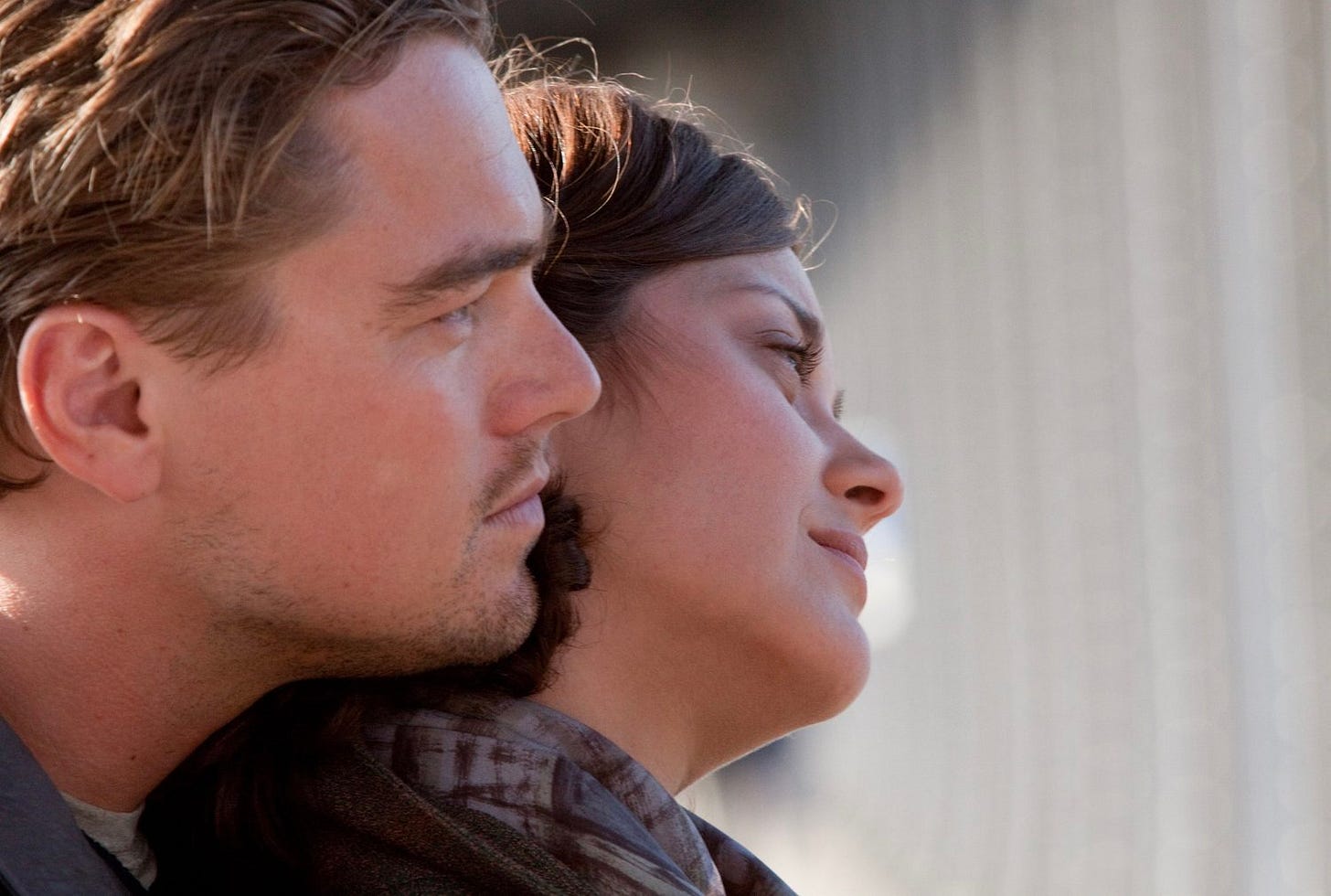Why you should take a leap of faith
And what INCEPTION shows us about believing in the impossible
“Do you want to take a leap of faith, or become an old man, filled with regret, waiting to die alone?”
It’s easy to criticize Christopher Nolan’s films for prioritizing intellect over emotion, but Inception pairs its heady themes with a strong beating heart.
The film found me again at exactly the right moment.
I first encountered Inception before its release in 2010, while sound mixing a project at Hans Zimmer’s film score company in California. Hans was deep into his creative process at the time, collaborating remotely with Nolan in London. I remember hearing the film’s monumental score beating down the doors of one of the screening rooms.
Late one night, I wandered into a studio to find the score still up in Pro Tools... I could have adjusted the mixing dials. Instead, I stared at the audio tracks in awe - as layered as the film itself would turn out to be - convinced that Inception was special.
Both the box office and critical reception agreed, with the film garnering eight Academy Award nominations and winning Best Cinematography, Best Sound Editing, Best Sound Mixing (hah!), and Best Visual Effects.
The story follows Dom Cobb, an “extractor” played by Leonardo DiCaprio, effectively a thief who specializes in stealing secrets from people’s subconscious minds during their dreams. He’s offered a chance to clear his criminal record and reunite with his children if he can successfully perform “inception” - a heist in reverse - the borderline impossible process of implanting an idea in someone’s mind instead of stealing one.
“What is the most resilient parasite?” Cobb asks Saito, his soon-to-be employer:
“A bacteria? A virus? An intestinal worm? …An idea. Resilient, highly contagious. Once an idea has taken hold of the brain, it’s almost impossible to eradicate. An idea that is fully formed, fully understood - that sticks.”
Cobb assembles his team for the high-stakes operation - a point man, a dream architect, a forger, a chemist. They must persuade Robert Fischer, heir to a dangerously successful business empire, to break up his father’s conglomerate. (Fun fact: Fischer’s played by Cillian Murphy, who won an Oscar for his work in Nolan’s 2023 film, Oppenheimer. I love when directors collaborate with the same team; it’s so much fun to track the magic they make together across projects).
To pull off their plan, Cobb & Co. prepare a multi-layered dream within a dream, each layer representing a deeper layer of Fischer’s subconscious. They reduce the complexity of a business decision down to the simplicity of a human relationship - take note, screenwriters! - planning to plant the idea of dissolution by reconciling Fischer with his late father. In a private cabin of a 747 en route from Sydney to LA, they have ten hours to share the dream, perform inception, and get out unnoticed.
But they weren’t expecting Fischer’s subconscious to have been trained by an extractor, creating hostile projections of his subconscious - or to risk losing themselves in “limbo”, the deepest layer of the dream, should they “die” while asleep - or Cobb’s projections of his late wife, Mal, perhaps the greatest threat of all.
Cobb’s unresolved guilt over Mal’s death is the emotional thread that connects the film’s many layers. It’s what I call the “character imperative” motivating the “plot imperative”… Generally speaking, the more the needs of the protagonist drive the “needs” of the A to B to C of the narrative, the more satisfying the experience of the film is, since the payoff works both in terms of story logic and emotional logic.
Resolving the plot simultaneously resolves the protagonist’s emotional journey.
[Spoiler alert] In this case, we learn that Cobb and Mal once lived together in limbo for decades (although just three hours passed in the waking world). Mal grew so attached to their shared dream that she refused to leave it.
In order to convince her to return to “real life”, Cobb incepted an idea:
Your world is not real.
He didn’t expect the idea to carry back across the threshold of their shared dream, into reality. Ultimately, it drove Mal to believe that the waking world was also a dream, and that the only way to wake up was to kill herself. So she did.
…“Once an idea has taken hold of the brain, it’s almost impossible to eradicate.”
As a result of Mal’s suicide, Cobb - devastated and overwhelmed by guilt - was framed and forced to flee the country a fugitive.
Which brings us back to the “leap of faith”.
The concept comes from 19th-century Danish philosopher Søren Kierkegaard, whose thinking I’ve found myself returning to time and again over the years. The leap of faith is a move beyond reason. It means embracing uncertainty, taking responsibility for your choices, and committing to something wholeheartedly, without any guarantee of the outcome. In Fear and Trembling, Kierkegaard describes the “knight of faith”, a hero who trusts in the absurd… The possibility of the impossible.
To get Cobb to agree to inception, Saito dangles the possibility of a fresh start in front of him, so that he can return to his children in America. “How do I know you can deliver?” Cobb asks. “You don’t,” Saito says. “But I can. So. Do you want to take a leap of faith, or become an old man, filled with regret, waiting to die alone?”
Cobb chooses to believe in the possibility of the impossible.
He takes the leap, in more ways than one.
Completing the mission means facing not only the perils of inception, but also his overwhelming guilt (“plot imperative” flows from “character imperative”). He believes Mal’s death to be his fault, which traps him in a limbo of his own making. To escape, he must stop running - from the authorities, from emotional closure, and from himself.
In the deepest layer of the dream, Cobb confronts the unknown. Without any guarantee of success, as time runs out and the dream world literally crumbles around him, he faces Mal’s projection and finds the courage to let go:
By taking this leap into uncharted emotional territory, by overcoming his fear that he might be unworthy of redemption, Cobb is able to forgive himself… Not in a way that absolves him of responsibility, but in a way that acknowledges that his guilt doesn’t have to define his life. He’s free to complete the mission and move forward.
This found me at exactly the right time.
I’m not wrestling with self-forgiveness right now, but there’re other areas of my life that resonate with Saito’s question, as I’m sure there are in yours.
Broadly speaking, will we let uncertainty paralyze us? Or will we find the courage to risk suffering and failure in pursuit of the absurd? If we make the conscious decision to trust in something beyond what can be proven or known - to commit to something, or someone, wholeheartedly - there’s no guarantee that it will work out.
But as one of my dearest friends reminds me, “Only two things matter in life - how fiercely you fight for your dreams and how bravely you love.”
Better to risk the abyss than let fear rob you of the one life that’s yours to live. If you take the leap and fall, then at least you can rest in the knowledge that you tried - and having tried, let go of the “What Ifs” that turn to regret later in life.
And anyway, what if you don’t fall, hm? What if the impossible is possible?
[Spoiler alert] No discussion of Inception is complete without addressing the ending, in my view one of the best in cinema history:
With their mission complete, Saito upholds his end of the bargain, and Cobb gets what he wants… He can return home! In a powerful moment of catharsis, he rushes to meet his overjoyed children in the garden.
The camera wanders away from their reunion to focus on Cobb’s totem, a spinning top that helps him determine whether he’s in reality or a dream.
If the totem falls, it’s reality. If it keeps spinning, it’s a dream.
We watch the top whirl, and wobble, and -
- CUT TO BLACK.
The ending doesn’t answer the question!
Is Cobb in the waking world? Or is he dreaming?
Does it matter?
“The point of the shot,” Nolan clarified many years later, “Is that the character doesn’t care at that point.” Cobb’s able to walk away from his totem because he no longer needs it to verify his reality. Instead, he accepts it, having made peace with his past, let go of his guilt, and chosen to live fully in the present.
What you believe shapes your reality.
Again, in Cobb’s own words: “An idea that is fully formed, fully understood - that sticks.” How much peace it must bring to give oneself over to an idea...
A couple of weeks ago, here in Nepal, I bumped into a tantric yoga instructor from Russia. “Solving world peace!”, hikers commented as we passed them on the trail through the jungle. But politics didn’t factor much into our discussion, because that’s not the world she lives in. “I dwell in mystic realms,” she explained to me.
The world she lives in is one in which visions of the gods appear to her during multi-day dark retreats in Bali. Astro-genealogy opens the door to communing with mysterious spiritual entities. She sought out a shaman under whom she smoked a potent natural psychedelic derived from the venom glands of a rare species of toad, an experience that guided her to the brink of death and back. And she practiced shared dreaming with a guru in Mexico, inspired by the works of Carlos Castaneda.
Incidentally, we were at the same screening of Inception at Movie Garden in Pokhara. I brought up my main criticism… In classic Nolan fashion, the narrative’s wound with mathematical precision, but dreams aren’t usually so clean and coherent. As brilliant as it is, the film indulges a stylistic mismatch between the story and its subject matter.
“No, no, no, you’re missing the point,” she said. “Dreams are internally consistent. They just need to play by their own rules, yes? Enough to convince you of their reality, so that you believe in it. There’s your coherency.”
She took a moment. “What do you think… Am I a character in someone else’s dream? In a story someone else is writing?”
“Do you want to be?”, I asked.
“I do today,” she decided with a smile.
Maybe she is, maybe she’s not.
But she’s one of the happiest people I’ve met in a long while.














